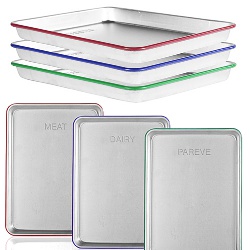The Alter of Novardok, Rabbi Yosef Yozel Hurwitz zt’l, taught that kosher utensils could be either meat, dairy, or parve, but a man cannot be pareve, he is only one way or the other. I have been thinking about this teaching for a good part of the summer (which is almost over since my kids started school this week).
Most of us have opinions. It’s part our personality. I, in my more colorful past, always had something to say about everything. Eventually as I got older, I curtailed my opinions on many social, political, religious, and community issues. In my more formative years of being frum I looked towards the middah of humility, anivus, as a crutch not to have such a strong opinion on things. This is completely the wrong way to behave. It was a mistake of my youth and one I regret. We all have opinions about things we are truly passionate about. It’s part of being created B’zelem Elokeim and emulating Hashem. Humility doesn’t mean you have to keep your mouth shut all of time.
“Man cannot be pareve,” say the Alter. We just can’t, because deep down inside us is a little voice giving an opinion. Those that claim to not have an opinion about things, really just don’t want to share their opinion with you or make it public. Not expressing your view is sometimes worse than voicing your opinion. Over the years I’ve seen relationships and friendships dissolve like sugar in a pot of boiling water because people try not to side with one party or the other. I have seen business deals destroyed, reputations soiled, and families torn asunder because people try not to take a side on an issue.
I am not advocating that we all need to make picket signs for every little cause we can think of, but it’s important to make known how you stand on an issue. This is especially true, I think, with your children. Children, as they grow up, need to understand the nuances of halacha, minhag, and hashkafa. They will only understand if they see us and the decisions we make. For example, if you don’t explain to your kids which hechsharim your family eats, then they might think that any hechshar is acceptable. I want my children to have opinions and know that it’s ok to speak up and defend someone. I want them to not be afraid to be in the minority about something they believe to be emes, the truth. I want them to follow the example of their parents, especially their mother. So, I guess that means that 5774 will be a year of finding a voice to express my opinion.







